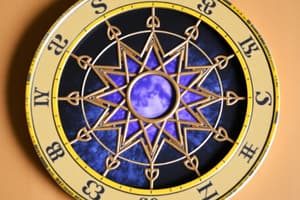Podcast
Questions and Answers
Match the following characteristics with their descriptions:
Match the following characteristics with their descriptions:
Lack of Empirical Support = Claims are not based on controlled scientific experiments Non-falsifiability = Theories cannot be tested or proven wrong Reliance on Anecdotes = Depends on personal testimonials rather than scientific data Absence of Peer Review = Findings are not subjected to scrutiny by the scientific community
Match the pseudoscientific practices with their descriptions:
Match the pseudoscientific practices with their descriptions:
Astrology = Predicts personality traits based on celestial positions Homeopathy = Suggests that highly diluted remedies can heal Psychic Phenomena = Claims about clairvoyance or telepathy Creationism = Rejects evolutionary biology for religious interpretations
Match the psychological biases to their definitions:
Match the psychological biases to their definitions:
Confirmation Bias = Favoring information that confirms existing beliefs Appeal to Emotion = Using emotional appeals instead of logical reasoning Desire for Certainty = Seeking clear answers to complex questions Cognitive Dissonance = Discomfort from holding conflicting beliefs or values
Match the potential dangers of pseudoscience with their effects:
Match the potential dangers of pseudoscience with their effects:
Match the terms with their meanings in context of pseudoscience:
Match the terms with their meanings in context of pseudoscience:
Match the terms used incorrectly in pseudoscience with their accurate definitions:
Match the terms used incorrectly in pseudoscience with their accurate definitions:
Match the pseudoscientific claims to their logical fallacies:
Match the pseudoscientific claims to their logical fallacies:
Match the concepts related to distinguishing science from pseudoscience:
Match the concepts related to distinguishing science from pseudoscience:
Flashcards are hidden until you start studying
Study Notes
Definition
- Pseudoscience refers to beliefs or practices that claim to be scientific but lack empirical evidence or the scientific method.
- It often presents itself as valid science but does not adhere to rigorous standards of evidence.
Characteristics
- Lack of Empirical Support: Claims are not based on controlled scientific experiments or observations.
- Non-falsifiability: Theories cannot be tested or proven wrong.
- Reliance on Anecdotes: Often relies on personal testimonials rather than scientific data.
- Absence of Peer Review: Findings are not subjected to scrutiny by the scientific community.
- Misuse of Scientific Terms: Jargon is often used inaccurately to give an impression of legitimacy.
Common Examples
- Astrology: Claims to predict personality traits and future events based on celestial positions.
- Homeopathy: Suggests remedies diluted to the point of non-existence can heal.
- Psychic Phenomena: Claims about clairvoyance or telepathy without scientific validation.
- Creationism: A belief system that rejects evolutionary biology in favor of a literal interpretation of religious texts.
Psychological Aspects
- Cognitive Bias: People may favor information that confirms their beliefs (confirmation bias).
- Appeal to Emotion: Pseudoscience often uses emotional appeals rather than logical reasoning.
- Desire for Certainty: Individuals may turn to pseudoscience for clear and straightforward answers to complex questions.
Potential Dangers
- Misinformation: Can lead to misunderstandings about health, science, and technology.
- Wasted Resources: People may spend time and money on ineffective treatments or products.
- Public Health Risks: Reliance on pseudoscientific practices can endanger health (e.g., anti-vaccine movements).
Distinguishing from Science
- Science relies on testable hypotheses, reproducibility, and peer-reviewed data.
- Pseudoscience often lacks a systematic approach and fails to evolve with new evidence.
Critical Thinking
- Always evaluate the source of information.
- Look for empirical evidence and peer-reviewed studies.
- Be cautious of claims that are too good to be true or lack rigorous testing.
Definition
- Pseudoscience encompasses beliefs or practices purporting to be scientific yet lacking empirical evidence or adherence to the scientific method.
- It often masquerades as legitimate science, disregarding the essential standards of evidence.
Characteristics
- Lack of Empirical Support: Claims are unsupported by controlled experiments or observational data.
- Non-falsifiability: Theories in pseudoscience cannot be tested or disproved, hindering scientific scrutiny.
- Reliance on Anecdotes: Personal testimonies are commonly used instead of systematic scientific data.
- Absence of Peer Review: Findings typically do not undergo evaluation by the broader scientific community, reducing their credibility.
- Misuse of Scientific Terms: Scientific language is often misapplied to create a facade of authenticity.
Common Examples
- Astrology: Posits that celestial configurations can predict individual traits and future occurrences.
- Homeopathy: Advocates for treatments that are diluted to an extent where active ingredients are virtually absent, claiming healing effects.
- Psychic Phenomena: Promotes abilities like clairvoyance and telepathy without empirical backing.
- Creationism: A belief system opposing evolutionary theory, supporting a literal interpretation of religious texts.
Psychological Aspects
- Cognitive Bias: Individuals often exhibit confirmation bias, favoring information that reinforces pre-existing beliefs.
- Appeal to Emotion: Pseudoscientific arguments frequently leverage emotional responses instead of logical reasoning.
- Desire for Certainty: Pseudoscience provides simplistic answers to complex queries, attracting those seeking clarity.
Potential Dangers
- Misinformation: Dissemination of inaccurate information about health, science, and technology can create public misunderstanding.
- Wasted Resources: Investments in ineffective treatments or products may result from adherence to pseudoscientific beliefs.
- Public Health Risks: Practices rooted in pseudoscience, such as anti-vaccine movements, can jeopardize community health.
Distinguishing from Science
- True science depends on testable hypotheses, reproducibility, and peer-reviewed empirical data.
- Pseudoscience generally lacks a structured framework and adaptation to new evidence.
Critical Thinking
- Assess the credibility of information sources critically.
- Seek empirical evidence supported by peer-reviewed research.
- Approach claims that appear excessively favorable or unsupported by rigorous testing with skepticism.
Studying That Suits You
Use AI to generate personalized quizzes and flashcards to suit your learning preferences.




